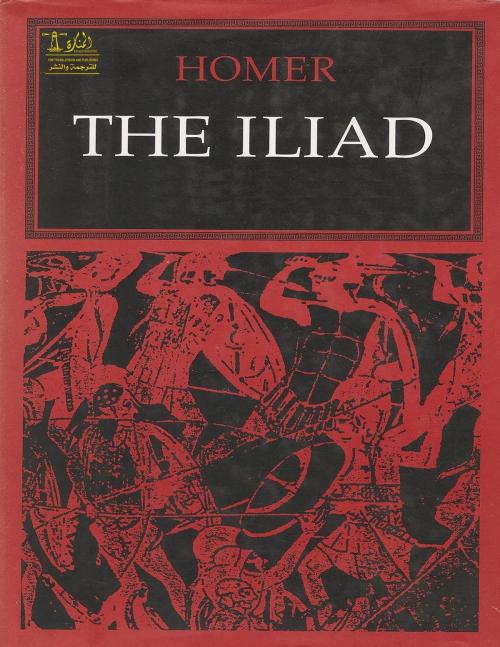| Author: | Homer | ISBN: | 9783593015002 |
| Publisher: | Lighthouse Books for Translation Publishing | Publication: | February 1, 2019 |
| Imprint: | Lighthouse Books for Translation and Publishing | Language: | English |
| Author: | Homer |
| ISBN: | 9783593015002 |
| Publisher: | Lighthouse Books for Translation Publishing |
| Publication: | February 1, 2019 |
| Imprint: | Lighthouse Books for Translation and Publishing |
| Language: | English |
The Iliad” (Gr: “Iliás”) is an epic poem by the ancient Greek poet Homer, which recounts some of the significant events of the final weeks of the Trojan War and the Greek siege of the city of Troy (which was also known as Ilion, Ilios or Ilium in ancient times). Written in the mid-8th Century BCE, “The Iliad” is usually considered to be the earliest work in the whole Western literary tradition, and one of the best known and loved stories of all time. Through its portayal of the epic subject matter of the Trojan War, the stirring scenes of bloody battle, the wrath of Achilles and the constant interventions of the gods, it explores themes of glory, wrath, homecoming and fate, and has provided subjects and stories for many other later Greek, Roman and Renaissance writings.
The story covered by “The Iliad” begins nearly ten years into the seige of Troy by the Greek forces, led by Agamemnon, King of Mycenae. The Greeks are quarrelling about whether or not to return Chryseis, a Trojan captive of King Agamemnon, to her father, Chryses, a priest of Apollo. When Agamemnon refuses and threatens to ransom the girl to her father, the offended Apollo plagues them with a pestilence.
The Greeks, at the behest of the warrior-hero Achilles, force Agamemnon to return Chryseis in order to appease Apollo and end the pestilence. But, when Agamemnon eventually reluctantly agrees to give her back, he takes in her stead Briseis, Achilles’s own war-prize concubine. Feeling dishonoured, Achilles wrathfully withdraws both himself and his Myrmidon warriors from the Trojan War.
Testing the resolve of the Greeks, Agamemnon feigns a homeward order, but Odysseus encourages the Greeks to pursue the fight. During a brief truce in the hostilities, Paris and Menelaus meet in single combat over Helen, while she and old King Priam of Troy watch from the city walls and, despite the goddess Aphrodite’s intervention on behalf of the over-matched Paris, Menelaus is the victor. The goddess Athena, however, who favours the Greeks, soon provokes a Trojan truce-breaking and battle begins anew.
The Iliad” (Gr: “Iliás”) is an epic poem by the ancient Greek poet Homer, which recounts some of the significant events of the final weeks of the Trojan War and the Greek siege of the city of Troy (which was also known as Ilion, Ilios or Ilium in ancient times). Written in the mid-8th Century BCE, “The Iliad” is usually considered to be the earliest work in the whole Western literary tradition, and one of the best known and loved stories of all time. Through its portayal of the epic subject matter of the Trojan War, the stirring scenes of bloody battle, the wrath of Achilles and the constant interventions of the gods, it explores themes of glory, wrath, homecoming and fate, and has provided subjects and stories for many other later Greek, Roman and Renaissance writings.
The story covered by “The Iliad” begins nearly ten years into the seige of Troy by the Greek forces, led by Agamemnon, King of Mycenae. The Greeks are quarrelling about whether or not to return Chryseis, a Trojan captive of King Agamemnon, to her father, Chryses, a priest of Apollo. When Agamemnon refuses and threatens to ransom the girl to her father, the offended Apollo plagues them with a pestilence.
The Greeks, at the behest of the warrior-hero Achilles, force Agamemnon to return Chryseis in order to appease Apollo and end the pestilence. But, when Agamemnon eventually reluctantly agrees to give her back, he takes in her stead Briseis, Achilles’s own war-prize concubine. Feeling dishonoured, Achilles wrathfully withdraws both himself and his Myrmidon warriors from the Trojan War.
Testing the resolve of the Greeks, Agamemnon feigns a homeward order, but Odysseus encourages the Greeks to pursue the fight. During a brief truce in the hostilities, Paris and Menelaus meet in single combat over Helen, while she and old King Priam of Troy watch from the city walls and, despite the goddess Aphrodite’s intervention on behalf of the over-matched Paris, Menelaus is the victor. The goddess Athena, however, who favours the Greeks, soon provokes a Trojan truce-breaking and battle begins anew.















